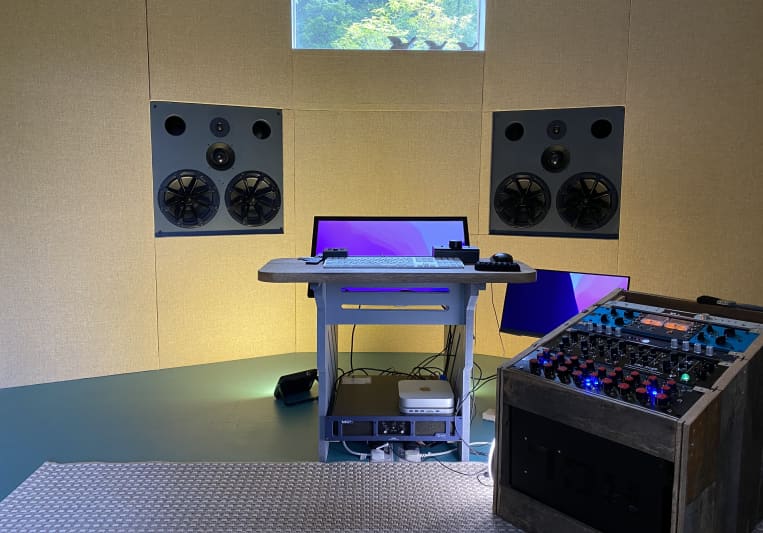
I’ve been producing music for 25 years and mastering professionally for 7 years, in that time I have mixed and mastered thousands of tracks, as well as providing mix feedback to hundreds of artists and labels.
Going deep into my musical past isn’t very interesting.. all you need to know is I have been mixing music since I was 14. Badly to start, then after thousands and thousands of hours spent making and mixing music I now I can say I’m good at it and have been for a while. I’ve not made my mixing life easy though, I have always experimented with sound and want to push further, make things bigger, sound louder than the next guy etc etc. That’s how I made mistakes in my mixes and learned from them. I started mixing other people’s tracks around 10 years ago and what has happened as a result of all this mixing and production is my ears are finely tuned which is what enabled me to become a mastering engineer, I don’t think you can be taught how to do this job, it’s all about experience over time.
The majority of mix problems are a result of mixing on small near field monitors in acoustically challenging rooms and/or inaccurate headphones. Bass is hard to judge unless you have accurate monitoring and if you can’t hear what’s happening low down then your judgment of the entire mix will suffer. I have a pair of custom built 3 way monitors which go from 22hz - 22000khz, if there is something out of place or causing problems I will know it in an instant. My monitoring chain is clean and there are very few reflective surfaces to avoid unwanted reflections to my ears.
Would love to hear from you. Click the contact button above to get in touch.
Interview with Joe Farr Mastering
Q: What are you working on at the moment?
A: A few of my own tracks for a new project. Also mixing and mastering around 12 projects this week. Busy !
Q: Is there anyone on SoundBetter you know and would recommend to your clients?
A: I will look.
Q: Analog or digital and why?
A: Both together. I like to be tactile with the equipment and also I haven't heard a digital compressor that sounds better than my Valve Compressor.
Q: What's your 'promise' to your clients?
A: They will be happy.
Q: What do you like most about your job?
A: Making clients really happy.
Q: What questions do customers most commonly ask you? What's your answer?
A: I have a great pool of clients and we work well together so there aren't too many questions, I get them and they get great service. But I guess there is usually a question about vinyl if they are going down that route. I answer honestly and as I don't cut I always recommend them to a reputable cutting enginneer.
Q: What's the biggest misconception about what you do?
A: It is a quick process.
Q: What questions do you ask prospective clients?
A: I have a form to ask all the technical questions, but apart from that.. What are you aiming for with this music / project.
Q: What advice do you have for a customer looking to hire a provider like you?
A: Get in touch and let's see if we fit.
Q: If you were on a desert island and could take just 5 pieces of gear, what would they be?
A: Vari Mu Compressor, Thermionic Swift, RME ADI Pro, Macbook, Audeze headphhones.
Q: What was your career path? How long have you been doing this?
A: I started producing when I was 14 and also Djing. I got my break when I was 28 signing to Turbo records. Then I got an agent and spent the next 10 touring, playing hybrid sets. I was producing all sorts of music whilst doing this but mainly released techno. So I've always been mixing, then mastring came around 7 years ago when I was able to have the space to build a studio.
Q: How would you describe your style?
A: Clean, clear and full.
Q: Which artist would you like to work with and why?
A: Any artist that is pushing in a new direction.
Q: Can you share one music production tip?
A: If you don't have a good monitoring environment, use headphone correction software.
Q: What type of music do you usually work on?
A: A broad range, ambient, techno, hard techno, hip hop, electronica, house, disco.
Q: What's your strongest skill?
A: Critical Listening
Q: What's your typical work process?
A: I analyse the track I am mastering with one listen through, then on the second listen I make the changes that come to me instinctually, then I print. Then I make any final adjustments and do any limiting that is needed. For mixing it's a longer process but follows the same path.
Q: Tell us about your studio setup.
A: I built my own mastering studio, it's fully treated, soundproof and acoustically flat, well as flat as I could get. I have a Hybrid setup with 4 pieces of select hardware and then the rest of the work is done in the box.
Q: What other musicians or music production professionals inspire you?
A: I have a broad musical taste, from Autechre to Brahms, from Billie Eilish to I hate Models. I love music that is pushing in new directions.
Q: Describe the most common type of work you do for your clients.
A: I mix, master and occasionally stem master. I also provide written feedback and zoom sessions to help people improve their mixing skills.
- Mastering EngineerAverage price - $50 per song
- Mixing EngineerAverage price - $200 per song
- RestorationAverage price - $75 per hour



